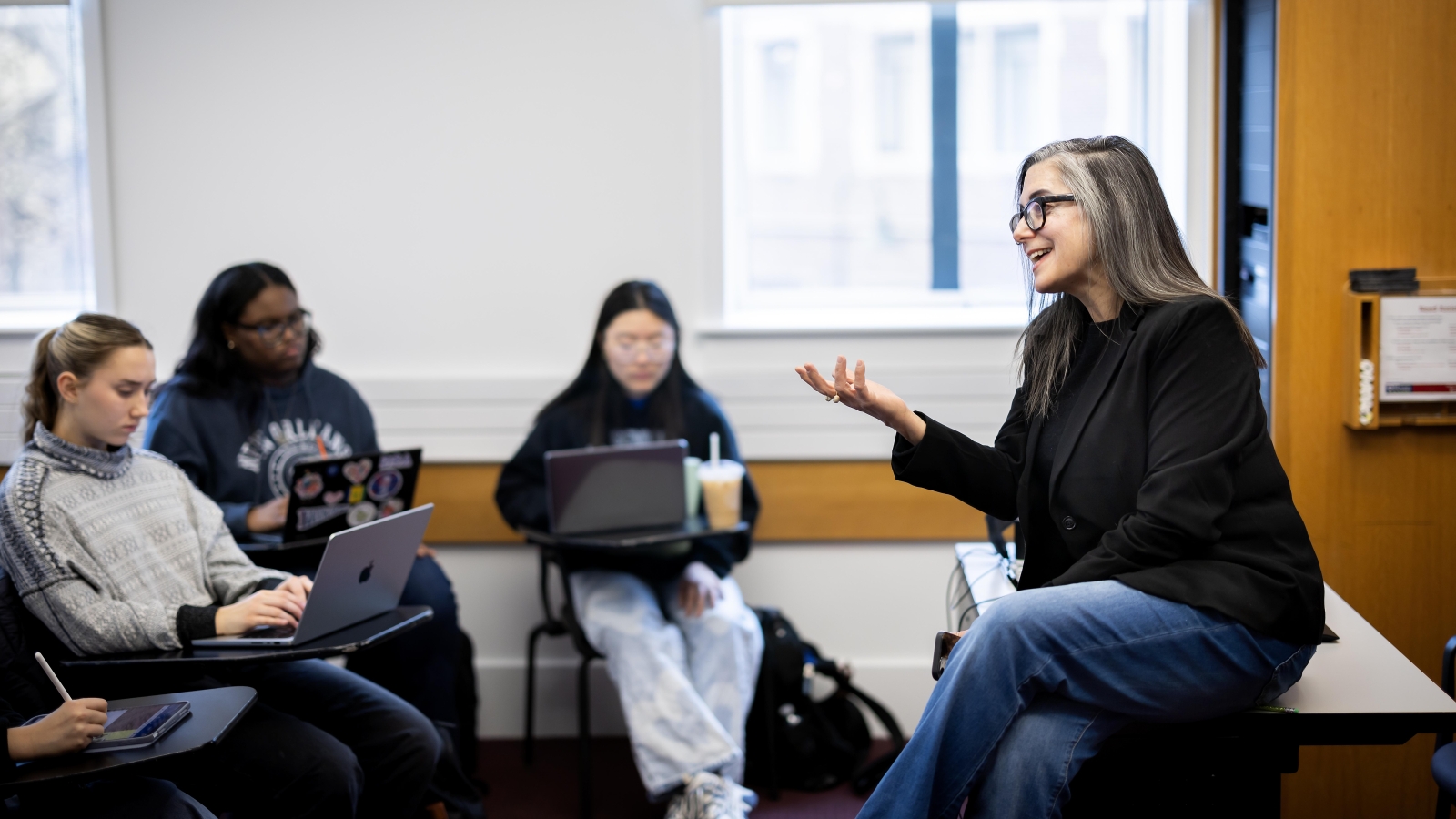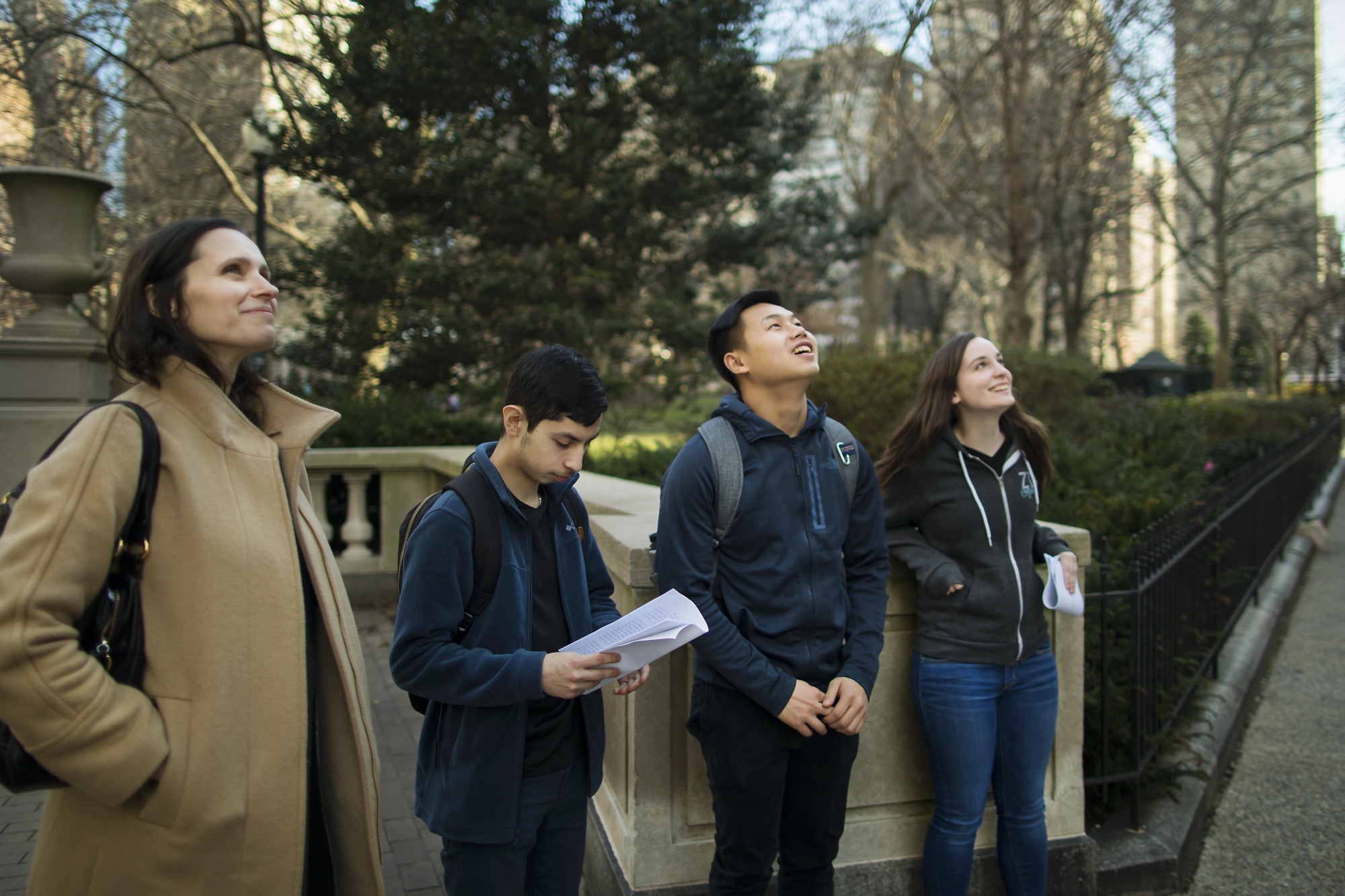Small Seminars Foster Sense of Belonging for New College Students
Sixty first-year seminars offer complex subjects in a comfortable group setting, as well as close connections to professors and peers. This year, 10 are also taking part in a pilot program focused on teaching students how to have respectful dialogue around difficult topics.

With only a few months left before the first Tuesday in November, the presidential election looms large across the U.S. And for 15 students in Michele Margolis’s first-year seminar, it represents their focus for the semester, a chance to learn about voting behavior and polling, electoral integrity and political strategy. They’ll also visit the NBC Decision Desk, where Margolis, an associate professor in the Department of Political Science and faculty fellow for Penn’s Program on Opinion Research and Election Studies (PORES), works as a junior analyst.
“I wanted to make the election exciting for the students,” she says. “I thought it would be really nice to teach a course like this in an election year because it allows us extra insight into that world.”
The class, called Decision 2024: Following and Understanding the Presidential Election, is the third first-year seminar Margolis has taught and one of 60 similar courses offered this fall through the College of Arts & Sciences. Their aim is to help new Penn undergraduates connect with the University and the College, learn complicated subjects in a comfortable group setting, get to know professors and peers at a deep level, and understand the “hidden curriculum” useful in navigating a large institution like Penn.
“The idea is that they are small seminars, and they’re taught by faculty,” says Molly McGlone, Associate Dean and Director of Academic Affairs for the College. “From a pedagogical perspective, they’re high-impact practice courses, meaning they’ve been identified as a cornerstone of a liberal arts education. Learning goals include defining what counts as evidence, walking students through how to craft an argument and how to make a case, thinking about how to have a robust debate, and presenting an argument. We want to provide them really durable habits of mind right off the bat.”
Taking this concept a step further, 10 of these seminars—in subjects from modern American poetry to the sociology of race and ethnicity—are participating in a pilot program this semester focused on teaching students how to have respectful dialogue around difficult topics.
The Core of First-Year Seminars
First-year seminars have been around for decades, by some accounts prompted by the Vietnam War protests—the academic response to a subject that divided the country, McGlone says. “They were created to help students have difficult conversations about things that were contentious in society. We’ve kind of come back around to that same idea.”
They’re small, usually 15 students max, and departments choose which to offer and who will teach them. Twenty-five years ago, incoming College undergrads could take one on consumer culture or tolerance; they could learn about oceanography or modern algebra. This past semester, options included a course about ancient Greece and Rome in children’s and young adult culture, and another, taught by McGlone, on music in urban spaces, which she’s teaching again this semester.
“It’s a fun experience for the faculty and for the students,” McGlone says. “They’re both at the intersection of new things and exciting topics, trying to figure out how to answer questions that don’t already have answers laid out.” Professor and pupils contemplate and learn together in a setting that typically doesn’t happen until junior or senior year in college, Margolis adds. “It makes teaching these seminars particularly special.”
Sociology professor Wendy Roth has offered Sociology of Race and Ethnicity as a first-year seminar for the past five years. “I really love teaching it. It is my specialty area, but more than that, it’s a delight to teach it this way because I really get to know the students well.” Typically, the semester includes conversations about how the field defines race and ethnicity and how the subjects have been researched in the past. Students read seminal sociology works and spend significant time writing in an effort to learn to “think like a sociologist.”
“We also spend a lot of time talking about what it’s like to be a student at Penn,” Roth says. She describes these aspects of Penn’s hidden curriculum as “invisible structures,” like how to make the best use of a professor’s office hours. Margolis often includes discussions of what it means to get involved with something like the Netter Center for Community Partnerships or PORES. “What I try to do is not just teach students the material but use it as a way to get them acclimated to Penn,” she explains.
A Pilot on Difficult Dialogue
This semester for the first time, 150 first-years will also experience something else: As part of a new pilot, they will participate in a group film viewing the day before classes start, then have dinner together and talk about what they watched. They’ll receive guidance from their professor, as well as a “learning assistant,” a sophomore, junior, or senior who previously took a class with the professor and who has been trained by Penn’s Paideia Program and the Office of Inclusion to lead dialogue on difficult topics. (These students also get paid by the College for their role.)
A lot of the same exercises, discussions, tools that you would use to build a sense of belonging are also going to help you learn how to be more critical in your thinking in a way that is not oppressing another group but is respectful, a way that is helping you have an opinion, learn a bit more, change your mind.
The idea for the initiative arose out of conversations within the College’s Committee on Undergraduate Education about ways to improve the first-year experience and to help students feel a greater sense of belonging within the School of Arts & Sciences, McGlone says. “We were thinking about how people work through not agreeing, how to have an open conversation, even some of the lingering stresses and anxieties having lived through a pandemic,” she adds. “A lot of the same exercises, discussions, tools that you would use to build a sense of belonging are also going to help you learn how to be more critical in your thinking in a way that doesn’t oppress another group but is respectful, a way that is helping you have an opinion, learn a bit more, change your mind.”
The program is still evolving. Coming up with a thread that applies to 10 courses is a very different mental exercise than finding one that works for 60. To scale up the program over time, more learning assistants will need to come on board and get trained, and course offerings and teachings may need to shift across Penn Arts & Sciences, according to McGlone.
Yet despite some potential challenges, McGlone and the other faculty involved in the planning are excited about this initial effort. “This is a moment when we need to learn to be able to hear other people respectfully,” Roth says. “We want to make sure we’re taking the time to listen to one another, that we’re not going to devolve into name-calling. We really want to foster dialogue, which can lead to more productive discourse.”
The course description for Margolis’s seminar promises the opportunity to “develop a nuanced understanding” of the 2024 election and its implications for American democracy. That’s the crux of all the College’s first-year seminars: Give students the time and space to try and fail. Ask them to hone their critical-thinking skills and to respect opinions different from their own. And help them develop a nuanced understanding, no matter the subject.
Main image (above): Melissa Jensen, who has taught English and writing at Penn for 15 years, in her first-year seminar Juvenilia, which ran for the first time in Fall 2023.




